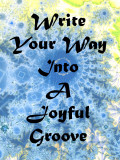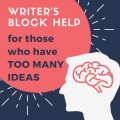Writer's Life: Staying True to Writing Your Own Truth

What do you do when you love to write, but your strength really isn't writing "about" something? How do you stay "true to your word" when that word doesn't involve anything "useful" like auto repair, recipes, child rearing, politics or travel tips? Or writing a gripping novel? In such a case, does writing your truth automatically relegate you to the ranks of hobbyist or perpetual blogger... unless you happen to be Dave Barry? Let's explore...

I was born at a very early age...
I learned to write when I was five, maybe six. Whereas I wasn't exactly home schooled, my parents believed that school was "inadequate" in terms of providing me with sufficient learning and mental stimulation. In some odd way, you could say that I was exposed to a "normal" curriculum at school, and then would come home to study more extensively in my own personalized program, administered by my mother. The methodology doesn't really matter-- what's relevant is that I was writing at about an 8th grade level by age seven.
Although my parents always emphasized "academics," I believe my mother secretly hoped I would turn out to be artistic. When I was just about seven, she bought me some blank exercise books, and encouraged me to "draw outside the lines;" to create my own pictures.
It didn't take me but a couple of months to fill them-- but the "mystery" (at least to my mom) was that I filled them with words, rather than with drawings. I thought the idea of "writing stories" was just the greatest thing ever, and crafted tales of talking moles and my teddy bear going to Mars.

Early Reality Checks...
Although writing held great appeal, felt completely natural to me and somehow offered an outlet for my rather vivid imagination and inner world, I really didn't consider the possibility that I was called to be "A Writer."
Well...
That's not entirely true.
I did consider the possibility, but my mother (especially) wasted little time in indoctrinating me into the philosophy that writing wasn't a "real" job, and that it mostly was a field that attracted "artistic flakes," and people who "couldn't make it in the real world," and-- besides-- you couldn't hope to make the income "our kind of people" were accustomed to. I was well into my 20's before I finally came to understand the staggering scale of my mother's delusions of grandeur.
One of my favorite books about writing

Reasons for writing... or not
I did take some creative writing courses in college, but found that they were (a) excessively about "writing to an assignment" and (b) that said assignments rarely bore much resemblance to what I was interested in writing about.
I did learn that I really wasn't much good at writing fiction-- my characters were always rather flat and boring, perhaps a reflection of my own rather isolated and boring upbringing. I did a passable job of writing "research style," but it bored me to tears. What to do?
What I truly enjoyed doing (and still do) was to pull random ideas out of thin air, and then explore them in the context of human motivation and relationships. I liked taking a look at the strangeness of human foibles and helping people past their stumbling blocks through offering a series of (often unusual) insights.
No, I'm not going to explain that in any greater detail. It would take me a dissertation to do so, and you'd end up going to sleep, and then I'd feel guilty about the keyboard indentations on your face. Suffice it to say that even when I was a preteen, I essentially wrote "commentary" and "personal observations" in my personal journals.

Writing as an expression of your own journey through life

Conversations with Professor Olmstead: "You're DOING it wrong!"
One of my creative writing professors in college was a very nice man who seemed to genuinely care about his students. Often, he would take time to talk to us about our writing and what we hoped to accomplish. Of course, I was in the business school and not an English major, which surprised him. It also struck him as "wrong" that I seemed able to generate reasonably fluent prose while pursuing such a "soulless" degree program and being a non-native English speaker.
That said, he would frequently wag a cautionary finger at me and berate me about my utter disregard for "the rules" of writing. Not least of which was my inclination to just sit down and write a piece from a-to-z without a plan, an outline, a draft or a revision. I'd just write it, and hand it in. In addition, I committed the cardinal sins of starting paragraphs with the word "and," overusing the ellipsis, and frequently resorting to four-word paragraphs.
And I still do...
We talked about "the writing life," and he gave me an often used bit of advice: "write what you know." I explained that what I mostly "knew" was the inherent inconsistencies of the human condition, what motivated people, how I could see their "patterns and paths" and how their choices influenced their lives, and how often folks were blind to their own toxic patterns. I was comfortable enough around him to share that I sometimes "intuited things" and "read people."
He was comfortable enough with me to share that I had a problem with run-on sentences, along with the attention span of a gnat.
In a manner not much more encouraging than my parents, he eventually told me that writing-- and selling-- my "interests" would "be a tough sell without a PhD in Psychology," and that I would "be better off" putting my energy into something "more marketable" like regular fiction, journalism, or perhaps some form of non-fiction/technical writing.

Sidetracking... for 15 years
I went on to spend 15 years in the "regular" business world. I felt utterly miserable most of the time, and failed fairly thoroughly at it. There always seemed to be an alarming gap between what my environment implied I "should" want, and what "felt right." This annoyed the business world, because it runs on "facts and figures," not on "feelings." Still, I wrote newsletters, sales brochures, advertising copy, radio ad scripts and much more.
People around me said "You really oughta write a book!"
I often replied "About what?" and would typically get responses like "I dunno. You just write well."
Eventually, I eased myself into technical writing. I rationalized to myself "well, at least it IS writing," while being well aware that I was deep in the throes of self-deception. I failed pretty thoroughly at that, too (technical writing and self-deception), both because it bored me to tears and because I loathed self-marketing and the self-promotion that was part and parcel of getting new "gigs" as a contract writer.
Writing from Spirit

"You're DOING it Wrong!" Part II
I eventually reached a point where I decided to toss most conventional wisdom about writing out the window and simply embrace "doing it wrong."
I was "helped," to a great extent, by the advent of the Internet... followed by the arrival of blogging, which is the ultimate personal publishing platform. A blog is also one of the greatest "experimental sand boxes" in which a writer can practice his or her craft.
I was 42 years old when I found myself in conversation with a friend (and author) about the way my love of writing tended to usually clash with my lack of interest in writing anything "useful." She'd just finished writing a book about finding meaning in your work, and she told me something important: "Something is a 'True Calling' to you, if you feel compelled to pursue it regardless of whether or not you'll ever be paid a single cent for your efforts."
We also talked about how you can't put a monetary value on "psychic" income... that is, the joy you derive from being able to do something you truly love.

A few Thoughts for Aspiring Writers
Whereas the realization that writing is truly my "Calling" was no help in putting food on the table or paying my electric bill, it did make me realize that I write... "because I have to."
It also allowed me to "let go" of the idea that when I write it has to be "for a living." The truth is that-- unlike a large number of writers-- I am not in it "just for the money." I write because I want to, and sometimes I "happen to" get paid.
And once I could let go of that "making a living" concern, it became much easier to just let the endless stream of words and commentary in my mind flow. And therein-- perhaps-- lies one of the core lessons in writing one's truth: When you're not invested in the outcome, the writing becomes "real;" your authentic and non-sterilized voice can be heard, because you're writing for your own JOY, not for "public consumption."
For some, that voice turns out to be "popular," and translates into a huge commercial success. For others, the voice is esoteric, and perhaps UN-popular and controversial, because it points people in directions they'd rather not look at... after all, there are a lot of "truths" people would prefer to pretend don't exist.
On a personal level, it led me to writing for small niche markets.
What I now realize is that I do usually "get money for writing." However, I never "write for money." And there's a big difference between those two.

These days, I have a few "main interests" I write about: I write about Highly Sensitive People (HSPs) and their challenges; I write commentaries about the personal journey to self-awareness, mostly for the Conscious Community and New Age press; I write about connections, love and relationships; I occasionally write about stamp collecting and other collectibles (because I make most of my living from them); sometimes I write about beach combing (which I also make money at), and even more "occasionally" I write about writing... even though I still feel like I know very little about it.
Perhaps it is very self-indulgent, but with the invention of blogs, I have pretty much stopped worrying about whether "someone will publish it," but in a way it offers me a lot of freedom to simply free-associate... something I highly recommend to all writers.
One final book recommendation. I don't generally recommend "how to" writing books... I think we are better off taking classes for that aspect of writing.








